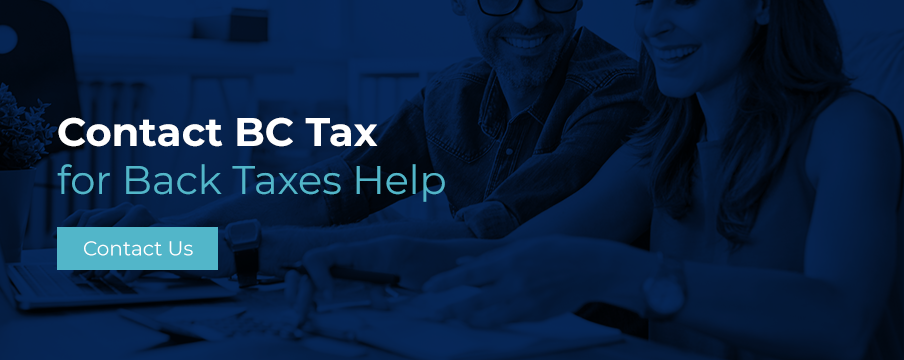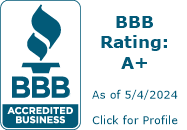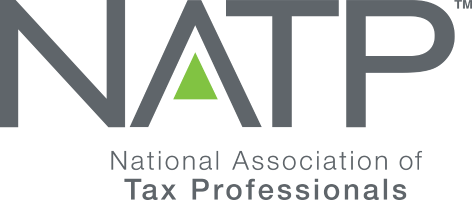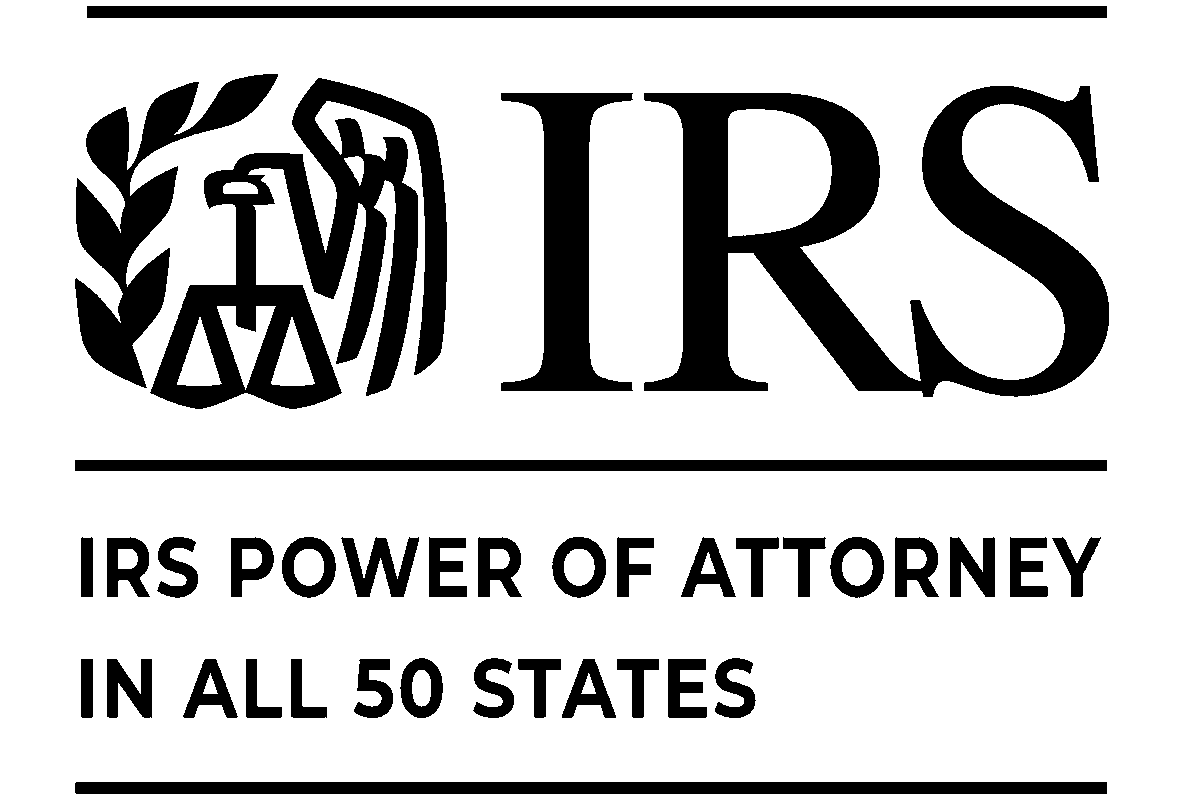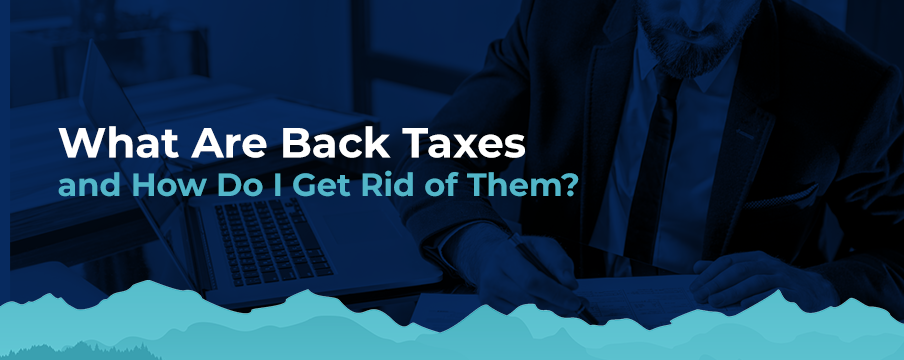
Are you feeling overwhelmed by back taxes? Do you wonder when you’ll ever be able to escape the tax debt you’re in? With a little help from us at BC Tax, you can regain control of your finances and get rid of your back taxes.
When you work with experienced CPAs, Enrolled Agents and tax professionals, you’ll receive assistance in filing your back taxes, resolving your back taxes or finding another financial solution. No matter the amount of debt you’re in from IRS back taxes, you can relieve yourself of this burden and dramatically improve your financial situation.
What Are Back Taxes?
Back taxes is the term for the amount of money you owe the federal, state or local government during a previous tax year. Your taxes become back taxes if you fail to pay some or all of what you owe when filing your tax return for the year. When you owe back taxes, you are responsible for paying the balance and any penalties or interest that accumulate on the amount due.
The IRS has reported that millions of individuals owe back taxes, meaning tax debt is a common obstacle for many Americans. It can happen to anyone for a multitude of reasons. While some taxpayers intentionally don’t pay taxes when they’re due, many unintentionally fall behind.
1. Why Do I Owe Back Taxes?
There are multiple ways to accumulate back taxes. Maybe you forgot to send the check. Maybe you didn’t realize you owed money. Maybe you thought you owed less. Ultimately, back taxes stem from a failure to pay some or all of the amount your tax returns claim you owe. Common reasons to owe back taxes include:
- Failing to pay the taxes you owe for the year when filing your return.
- Sending an amount less than what you owe with your tax return.
- Omitting a portion of your income from that tax year.
- Neglecting or forgetting to file a tax return.
If you don’t pay all of the taxes you are required to pay in that tax year, you’ll owe the IRS payment for back taxes. The IRS will send out notices to you about these unpaid taxes.
2. What Happens If I Don’t Pay My Back Taxes?
If you fail to pay the money you owe from a previous tax year, the IRS will be in touch to collect. You will have to pay some or all of the amount you owe plus interest and penalties, even if the missed or insufficient payment was an accident. The definition of back taxes encompasses any and all past-due tax payments — the IRS will keep track of it all and pursue payment.
The IRS will inform you of your debt by mailing you a CP14 notice when you owe back taxes. The CP14 notice will explain the amount you owe, how to pay and when the payment is due. Notices will continue to arrive if you continue to leave the balance unpaid. The balance will accumulate interest during that time If these taxes continue to go unpaid after several notices, the IRS will charge an additional failure to pay penalty on top of the unpaid tax debt. The interest on the debt is between 0.5% and 25% for every month you are late on repaying your tax debt.
For those who can’t pay back taxes, the consequences can be serious. The government may:
- Garnish your wages
- Press charges
- Seize your home
- Seize your bank account assets
- Demand immediate payment
3. Can I Go to Prison for Missing Tax Payments?
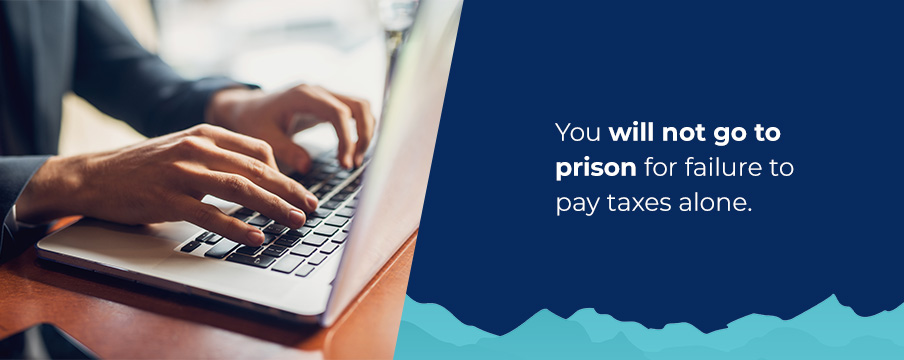
You will not go to prison for failure to pay taxes alone. A prison sentence would result from a criminal charge such as tax fraud or evasion. If you were to commit a criminal tax offense, the IRS may offer an opportunity for voluntary disclosure. When combined with tax liability cooperation, voluntary disclosure could allow you to avoid criminal charges for tax infractions.

How to Get Rid of Back Taxes
If you owe the IRS, you have a few options for how to pay back taxes. Knowing your options will allow you to pick the best plan for you. If you owe back taxes and can’t pay them, you may be able to choose from these options:
- Pay with a debit or credit card
- Take out a personal loan
- Request a short extension
- Borrow money from your 401(k)
- Apply for an installment agreement
- Apply for an Offer in Compromise
- Apply for non-collectible status
1. Pay With a Debit or Credit Card
Paying with a credit card or debit card is a convenient payment method for many taxpayers. You have more control over the payment process — you choose when you make the payment.
When you use a credit card, you may also earn rewards, such as points, miles or cash back. Of course, a credit card balance that is too high could also negatively affect your credit score. You’ll also need to pay a small percentage for the card’s processing fee.
If you already have credit card debt or you won’t be able to pay off your balance in full, then paying your back taxes with a credit card may not be the best option.
2. Take Out a Personal Loan
You may be able to take out a personal loan to pay for your back taxes. With a personal loan, you’ll have a consistent monthly payment, and the cost for the loan may be less than a credit card or an IRS payment plan.
This option may not be right for you if you’ll be paying more in interest than you would through a repayment plan with the IRS. If you make a late payment on the loan, your credit score can also be negatively affected.
You may also be able to obtain a personal loan from a relative or friend. Depending on the source, the cost and fees associated with this loan vary. Compare the calculations for a personal loan versus a credit card payment or an IRS repayment plan to determine if a personal loan would be the better financial option for you.
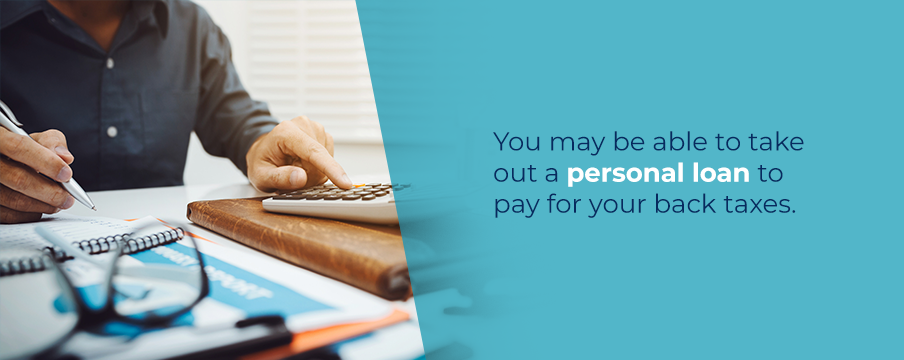
3. Request a Short Extension
The IRS will give a taxpayer who requests an extension up to 120 additional days to pay their balance. If you anticipate that you’ll be able to save up enough to pay your back taxes in full in just a few months, then this may be a convenient payment method for you.
You won’t have to pay a fee when you request this extension, but if you do receive a short-term extension, the IRS will still charge interest on your debt. You’ll also incur a monthly penalty of 0.5% until you pay your full balance.
4. Borrow Money From Your 401(k)
If you’re allowed to take a loan from your 401(k), you may want to consider this as a way to get rid of your back taxes. This can be an inexpensive and accessible cash source to pay off your tax debt. If you don’t repay this loan, however, you can negatively impact your retirement savings.
Most with access to this loan will be limited to a maximum of $50,000. You’ll also need to pay back this loan within five years. If you fail to make timely payments, you leave your employer before repaying the loan, or your plan is terminated, then this 401(k) loan will be considered a taxable distribution. You may also have to pay an early distribution penalty.
If none of these options sound right for you, there are more plans for you to choose from. These are three of the most common ways for taxpayers to get rid of back taxes:
- Installment agreements: Payment plans with the IRS
- Offers in Compromise: Settling back taxes for less than the owed amount
- Non-collectible status: A temporary delay in collection
Installment Agreements
If you owe back taxes, the IRS offers payment plans known as installment agreements.
1. What Are Installment Agreements?
Installment agreements are payment plans made directly with the IRS to pay your back taxes over a set period. Generally, these plans are paid in monthly installments. The type of installment agreement you’ll be able to get depends on the details of your situation, such as how soon you’ll be able to pay your balance and how much you owe.
2. What Are the Penalties and Fees for Installment Agreements?
With an installment agreement, the penalty placed on your tax debt will be reduced to a monthly rate of 0.25% until you pay your balance in full. You’ll also need to pay interest on this debt and an application fee.
The application fee depends on your payment method — the fee is lower if you apply online and pay through automatic withdrawals than if you use another payment method, such as mail, phone or in-person. If you are a low-income applicant, the fee is reduced and may possibly be waived or reimbursed. If you’re unsure whether you’re considered a low-income applicant, you can check whether you qualify via the IRS Form 13844.
3. How Can You Make Your Payments?
You can pay your monthly payments with automatic withdrawals or with a debit or credit card. If you pay with a debit or credit card, you’ll also need to pay a processing fee. For tax debt of more than $25,000, you’ll need to set up automatic withdrawals to make your payments.
4. What Happens if You Don’t Make Payments on Time?
If you don’t pay according to the set schedule, the IRS can void your installment agreement.
5. Is an Installment Agreement the Right Option for You?
If you can’t pay your back taxes, an installment agreement may be the best option for you. With automatic withdrawals, taxpayers don’t have to worry about forgetting monthly due dates for payments.
This option is best for taxpayers who won’t be able to pay their tax debt within 120 days and owe a maximum of $50,000. If you know you’ll be able to pay your back taxes in full within 120 days, you may want to opt for an extension rather than an installment agreement.
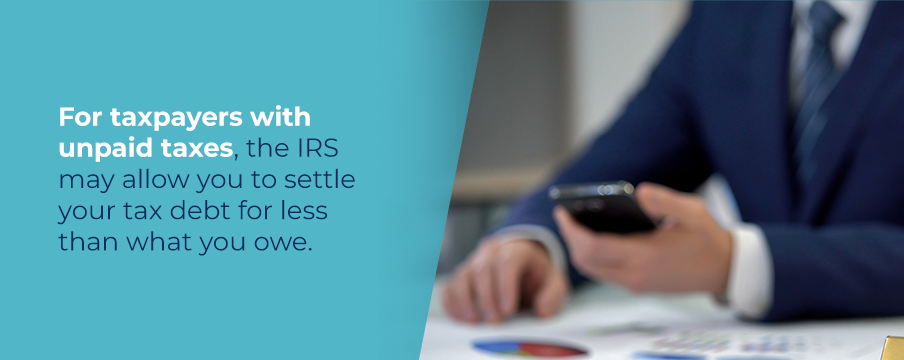
Offers in Compromise
For taxpayers with unpaid taxes, the IRS may allow you to settle your tax debt for less than what you owe. This solution is known as an Offer in Compromise. Understandably, an Offer in Compromise is often the most appealing option for taxpayers who owe back taxes.
Unfortunately, many applicants won’t be approved for an Offer in Compromise, as the IRS believes the majority of taxpayers are able to repay their tax debt. This is why many taxpayers turn to a service like BC Tax to successfully receive an Offer in Compromise from the IRS.
1. What Are Offers in Compromise?
When a taxpayer owes a tax debt they are unable to pay, they may be able to receive an Offer in Compromise to settle their tax debt for less than what they owe. This is an option available from the IRS for taxpayers in hardship situations.
To qualify, you’ll need to prove that paying your tax debt would result in financial hardship according to the financial standards set by the IRS.
2. What Are the Penalties and Fees for Offers in Compromise?
There are no penalties associated with offers in compromise, but there are other fees and costs you’ll need to pay. When you apply for an Offer in Compromise, you’ll need to pay:
- A $186 application fee: If you’re a low-income taxpayer, you can get a waiver so you don’t have to pay the application fee.
- An initial payment: This payment is nonrefundable and is either your first monthly payment or 20% of the amount you’ll be paying.
- Interest: Your debt will accrue interest, which you’ll also be responsible for paying.
Your federal tax liens won’t go away until you’ve repaid your tax debt.
3. Is an Offer in Compromise the Right Option for You?
To qualify for an Offer in Compromise, you must be current on your tax returns. Taxpayers who haven’t filed tax returns in a while may not qualify. If you are currently in an open proceeding for bankruptcy, you also won’t qualify for an offer in compromise.
If you cannot pay your back taxes and paying your debt would result in financial hardship, you may want to consider applying for an Offer in Compromise to get rid of your back taxes.
Non-Collectible Status
For taxpayers with unpaid back taxes, the IRS also offers an option known as non-collectible status.
1. What Is Non-Collectible Status?
If the IRS believes you aren’t able to pay your taxes along with reasonable living expenses, then your debt may be declared non-collectible. When your debt is declared non-collectible, it’s referred to as currently not collectible. During this time, the IRS will cease any aggressive collection tactics like garnishing your wages or seizing your assets.
2. What Are the Penalties and Fees for Non-Collectible Status?
While your tax debt is in non-collectible status, your debt will still accrue interest and penalties. These can add up to a significant amount over time. In addition, you’ll be forfeiting tax refunds that you would otherwise receive.
3. Is Non-Collectible Status the Right Option for You?
You may be asked by the IRS to complete a Collection Information Statement. This is to prove your finances are as dire as you claim. On this form, you must supply information about your expenses and monthly income.
This form of tax relief is temporary, and the IRS will continually review your financial situation to determine whether it has improved. Non-collectible status won’t make your back taxes disappear, and the IRS can continue collecting tax debts for up to 10 years.
Contact BC Tax for Back Taxes Help
Are you unable to pay your back taxes? If the stress of your unpaid tax debt has been keeping you up at night, a tax professional can help you get rid of your tax debt. At BC Tax, we help taxpayers in Colorado and across the U.S. find tax relief through tax penalty abatement
and numerous other back tax services.
With BC Tax on your side, you can take control of your financial situation. Let us take the weight of your tax debt off your shoulders. Contact us for a free, no-obligation consultation to learn about all of your options.
Our Back Tax Services:

 1-800-548-4639
1-800-548-4639